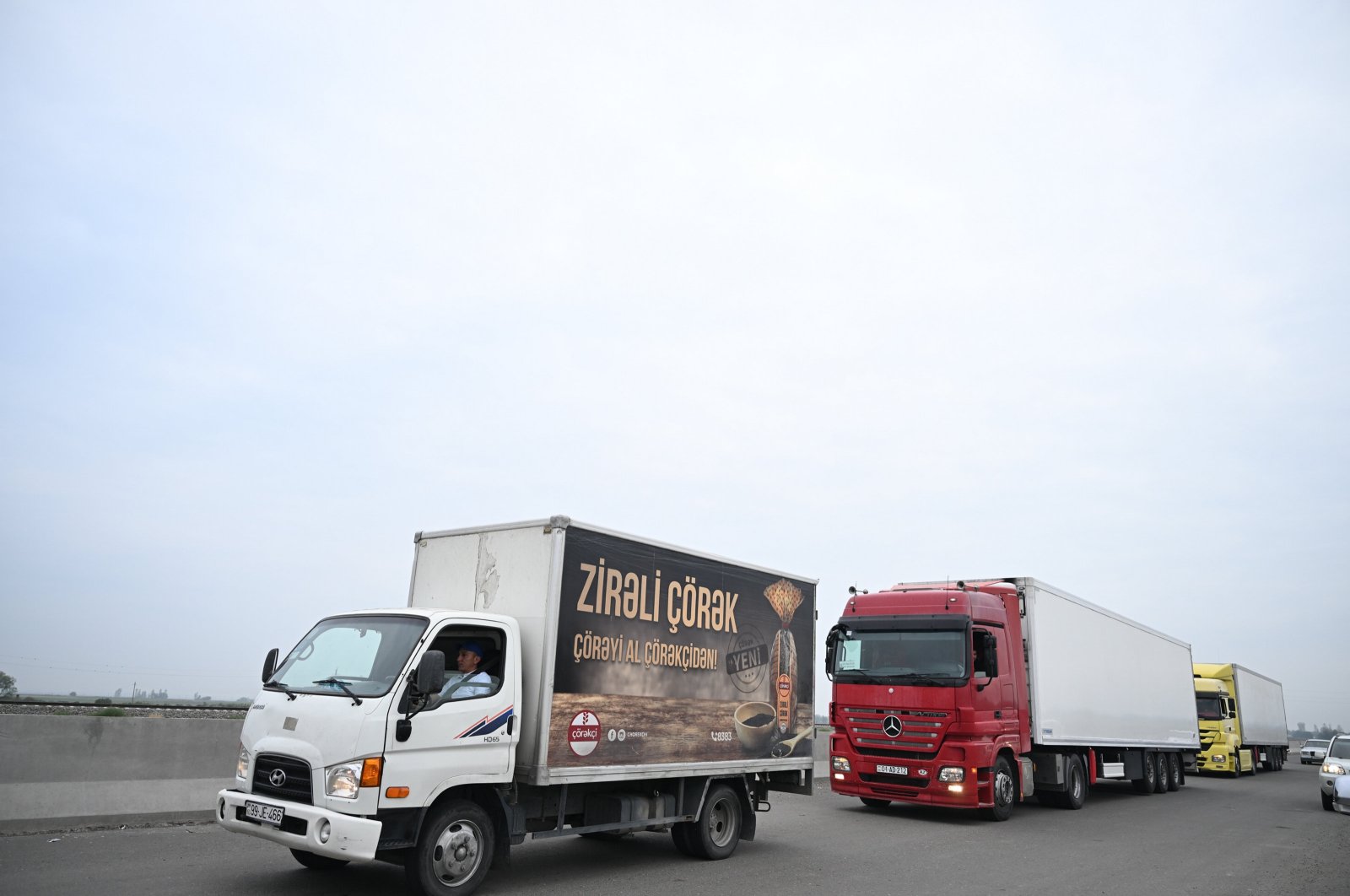
Azerbaijan sent trucks of aid to the Armenian community in Karabakh on Friday following a cease-fire in the aftermath of a counterterrorism operation while Baku extended an offer of peace to Armenia
Karabakh was calm on Friday after Azerbaijan conducted a counterterrorism operation earlier in the week. The cease-fire was declared following the operation held, one day after a delegation representing separatist Armenians in the region held talks with Azerbaijani officials. A convoy of trucks carrying humanitarian aid dispatched by Baku streamed into the mountainous region in the meantime.
The separatists agreed to lay down their arms on Wednesday as part of a Russian-brokered cease-fire plan that halted Azerbaijan's 24-hour offensive to retake land at the center of decades of conflict. Azerbaijan's presidency said the two-hour meeting had been "held in a constructive and peaceful atmosphere" in the presence of Russian peacekeepers. Both sides expressed readiness to hold more talks. Baku's negotiators presented plans for the "reintegration" of Karabakh's Armenian population into Azerbaijan and pledged to provide urgently needed fuel, humanitarian supplies and medical care to residents.
While the meeting was happening, gunfire rang out in the separatist stronghold of Stepanakert (Khankendi), despite the truce deal. The Karabakh separatists accused Azerbaijan of violating the cease-fire, but Baku denied the allegation. Russia's Defense Ministry also said it observed "five cease-fire violations" in the areas of Shusha and Mardakert.
Hours later, Armenian and Azerbaijani foreign ministers clashed during a U.N. Security Council emergency meeting on the crisis. "There are no more sides of the conflict, but perpetrators and victims. There is no more conflict, but the real danger of atrocity," said Armenian Foreign Minister Ararat Mirzoyan.
"The intensity and cruelty of the offensive makes it clear that the intention is to finalize ethnic cleansing of the Armenian population," Mirzoyan added. His Azerbaijani counterpart Jeyhun Bayramov accused Armenia of disinformation. "Armenia's attempt to exploit the U.N. Security Council in its campaign to mislead the international community is deplorable," Bayramov said.
Since the collapse of the Soviet Union, Armenia and Azerbaijan have fought two wars over the small mountainous region. Now, there are concerns of a fresh refugee crisis as Karabakh's Armenian population fears being forced out. Armenia's Prime Minister Nikol Pashinian said the cease-fire was holding overall and he did not see a "direct threat" to the civilian population.
The collapse of the separatist resistance represents a major victory for Azerbaijani President Ilham Aliyev, who said his country had restored its sovereignty over the region.
The apparent capitulation of the separatists has sparked jubilation among Azerbaijanis. But in Armenia, it ratcheted up pressure on Pashinian, who has faced stinging criticism for making concessions to Azerbaijan.
Thousands of angry citizens rallied outside his offices in Yerevan on Thursday, waving Karabakh flags. "Today is the day of our shame. Nikol stole our homeland," pharmacist Arkady Balayan, 32, told Agence France-Presse (AFP). "Nobody wants to save us, we don't have a strong enough army ... We're on our own, everyone has let us down," lawyer Angela Adamian said.
Azerbaijan envisages an amnesty for Karabakh Armenian fighters who give up their arms though there have been some Karabakh military units that have said they will continue their resistance, a presidential adviser told Reuters.
"Even with regard to former militaries and combatants, if they can be classified in such a way, and even for them we are envisaging an amnesty or alluding to an amnesty as well," Hikmet Hajiyev, foreign policy adviser to Azerbaijan's president, told Reuters.
"Currently we are seeing that some individual army groups and officers that made the public statements that they won't come to our terms and will continue resistance," he said.
He said that Armenians of Karabakh had asked for humanitarian help and that three shipments of cargo would be delivered to the region on Friday. Azerbaijan wants the peaceful reintegration of Karabakh Armenians, he said.
On Friday morning, two large and two smaller trucks headed to Aghdam in Karabakh. Carrying 40 tons of food and hygiene products, the trucks are traveling to Stepanakert (Khankendi), where the counterterrorism operation was concentrated.
Khankendi: Key city
At the heart of Karabakh, Khankendi bears importance for Azerbaijan as it strives to reclaim its old territories. For professor Çağrı Erhan, it is also important for Azerbaijan's security. Erhan, an international relations expert who serves as the rector of Altınbaş University in Istanbul, told Daily Sabah that without Khankendi, Karabakh's territorial integrity and security cannot be maintained.
Erhan notes that the 2020 war ended without a final peace agreement but rather a cease-fire deal stipulating Armenia's recognition of Azerbaijan's territorial integrity and prevention of threats against Azerbaijani citizens.
"Despite this, separatist Armenian terrorist groups continued armament, particularly in Khankendi, and started plotting attacks targeting Azerbaijani civilians and security forces. Since the cease-fire (after the Karabakh war), more than 300 Azerbaijani citizens were killed in those attacks, according to Baku, and Baku persisted in calls to Armenia to stop the attacks," Erhan highlighted.
A Turkish-Russian observation center set up after the 2020 Karabakh war detected 258 violations of the cease-fire by Armenia since January 2021, according to a report by Anadolu Agency (AA). The center employs drones and other reconnaissance equipment to detect violations.
